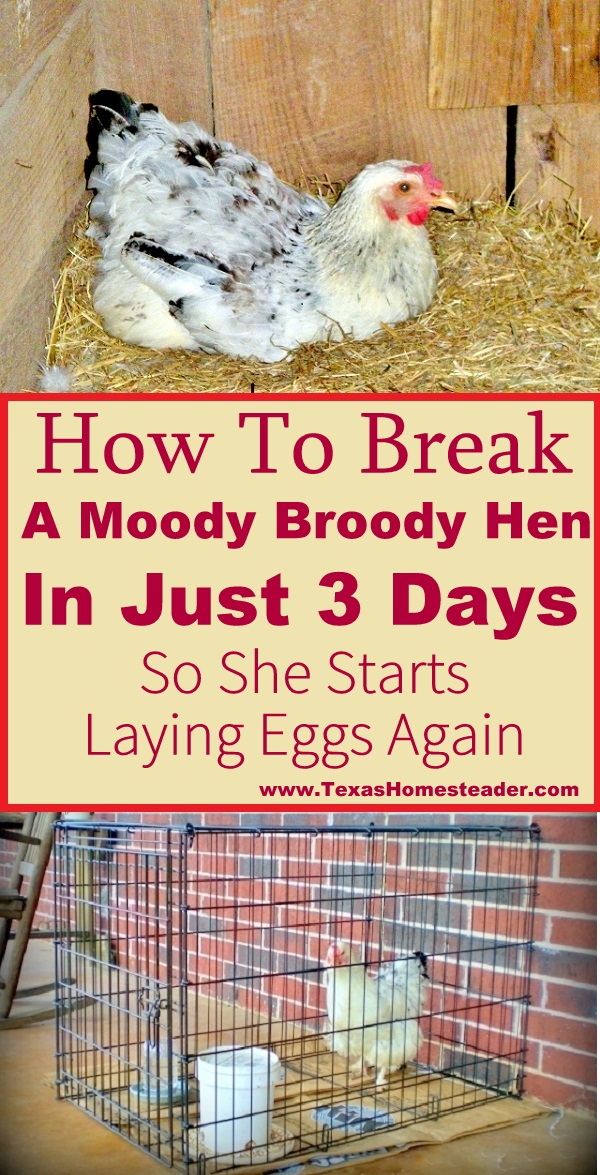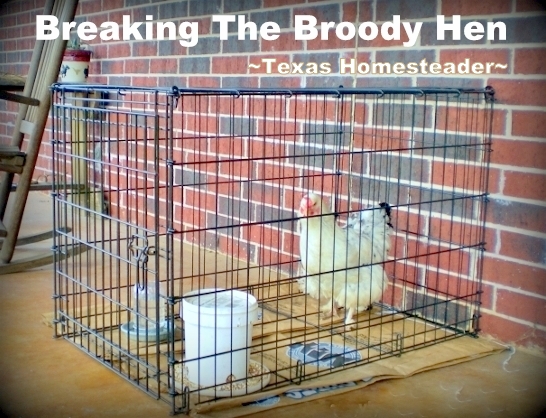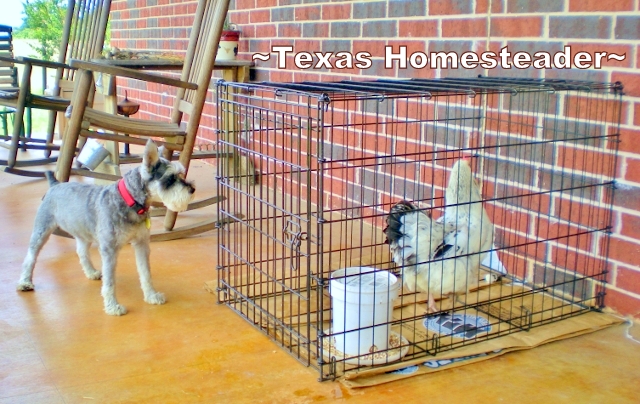by Texas Homesteader
Have you ever had to deel with a broody hen? That’s when she collects a whole clutch of eggs and sits on them trying to get them to hatch.
During that time she doesn’t eat much, and she doesn’t lay any more eggs. Her main focus is on hatching those eggs into baby chicks. Sometimes that’s a good thing, sometimes not.
We started keeping chickens every year and they are an absolute blast to keep. But we always sell them all in late fall. Free ranging hens in the winter months would just make them easy prey for predators since food gets more scarce in the wintertime.
But we sure enjoyed those fresh free-range eggs. There’s absolutely nothing like the taste of a free-range egg, you chicken raisers know what I mean!
So we are pretty excited to obtain chickens each spring to start the process over. We contacted a local breeder and purchased 4 hens from her and BOOM! We were back in the chicken business for the year.
Hen Goes Broody
But one of the hens quit laying eggs & became broody several weeks after we purchased her – we’d never dealt with broody hens before. And with no rooster in our flock her broodiness wasn’t helping anyone, neither her nor us.
Since I’d never experienced broodiness in hens I allowed her to sit for a few days thinking it would soon pass. She’d quit laying fresh eggs but was always sitting on the nest each time I went to check on her – even though there were no eggs for her to sit on!
OK, so waiting for it to pass didn’t work, what else can I try?
Trying Different Ways To Break Broody Hen
I put out a plea on our Facebook page for advice and there were many great ideas.
One FB follower said they move their broody hen further away from the nest and she usually gets distracted enough not to go back to lay. So I tried that. But our girl always went back to the nest.
So I started closing the chicken coop door when I let them out each morning so she couldn’t get back to the nest. But that also kept the others away from the nesting boxes. Hummm… that won’t work.
But what else can I try? By now she’s been broody almost three weeks with nary an egg during all that time!
Separating A Broody Hen
Another Facebook follower recommended a page with great information on breaking broody hens from a writer whom I consider to be the authority of raising chickens, Kathy over at The Chicken Chick. (slaps forehead) Why didn’t I think of her in the first place???
Her article had great advice and I learned a lot. First of all broody hens like it dark & quiet with a soft feathered nest. Our task is to give her the opposite circumstances so she’ll find being broody uncomfortable. It will help break her broodiness faster.
I had heard that advice before from a veteran chicken raiser. (thanks dad!) But Kathy laid it all out with pictures and examples.
Finding A Brood Buster Cage
So RancherMan & I followed her advice to the best of our circumstances. We didn’t want to buy any special equipment so we just used what we had – a large dog crate.
Now I’d have preferred our broody-buster to be a little smaller. The whole point is to make her a little more uncomfortable with being broody. But hey, use whatcha got is what I say!
We decided to set it up on our back porch for many reasons:
- It’s a good location to keep an eye on her and keep her safe from predators.
- I know her Broody-Buster pen needed to be kept somewhere bright as those conditions are less comfortable to her being broody. The porch gets shade during the hot part of the day, but it’s plenty bright.
- She will be staying on our hard cement patio (with paper laid down first of course) which will make it slightly more uncomfortable for her. I would have loved to follow Kathy’s advice and elevate the cage so air could circulate to keep her belly & chest cool. But the grid on the bottom of this dog crate was very open and we didn’t have any extra welded wire fencing to reinforce it. This setup will just have to do.
- Our Mini Schnauzer Bailey can see the hen from the living room windows and also walk past the hen when we take her outside. We’re hoping that desensitizes Bailey to chickens and makes them more safe around her in the future. When Bailey was adopted she was always way too energized around the chickens when we take her to the coop on a leash. So this continues her training. (UPDATE: Bailey’s great around the chickens now!)
Our Brood Buster Setup
Here’s how it worked for us: We put a couple of feed sacks beneath the crate to catch droppings. We still had a small chick waterer from when we raised day-old chicks last year.
So we brought it out and filled it with fresh water. We added a Homemade Chicken Feeder that we had thrown together last year out of parts we had laying around the house.
When her new diggs were ready I went to the barn’s coop (where I KNEW she’d still be) I scooped her up gently and carried her to the house.
I’m fortunate that she doesn’t get aggressive even though she’s broody. From what I understand aggression is pretty standard for broody hens. That would have made this part more uncomfortable for both of us!
How Did Our Broody Hen React?
Once she was in the Broody-Buster she was pretty irritated, clucking away and pacing the cage. She became more & more uncomfortable the longer she stayed locked in that cage, looking around for a way to get out and pacing constantly.
Sorry girl, this is going to be your new home for a few days. But it’s for your own good.
What about Bailey’s interactions? She was keenly interested in the hen at first. The interest had her going around the cage with some excitement and sniffing at the crate, even yipping at the hen from time to time.
But just as we had hoped, as time went by she didn’t show the hen more than a casual glance.
And we purposely brought Bailey close to the crate on several occasions. We wanted her to learn that this critter was allowed here and was not to be harassed.
The hen stayed in the Broody Buster for 3 days before we carried her back to the barn to see how she reacted.
Nervously we set her down next to the other hens as they scratched around in the dirt at the barn.
Success!
HOORAY! She was back to her old self hanging out with the other hens, chasing bugs and taking dust baths.
We’ll be sure to keep this broody buster in mind when one of them starts to go broody again. Next time we’ll nip that habit in the bud more quickly!
What are your favorite ways of dealing with a broody hen?
Chicken-Care Posts
- How To Teach Free-Range Chickens To Come HOME
- Breaking The Broody Hen
- What Color Eggs Will My Chickens Lay?
- MYO Low-Waste PVC Chicken Feeder
- Repurposed Coffee Can Chicken Feeder
- Keeping Wild Birds Away From Your Chicken Feeder
- Nutritional Difference Of Free-Range Eggs
- How To Protect Seedlings From Free-Range Hens
- Keeping Our Chickens Mite Free
- How To Get Free Chicken Food
All Posts About Chickens
C’mon by & sit a spell! Come hang out at our Facebook Page. It’s like sitting in a front porch rocker with a glass of cold iced tea – lots of good folks sharing! You can also follow along on Pinterest, Twitter or Instagram.
If you’d like to receive an email each time a new blog post goes live it’s EASY to
Subscribe to our blog!






These are some great tips! I don’t have any chickens… yet, but I’ve been reading about them so I’m prepared when I finally get my coop ready! Thanks for sharing with Thursday Favorite Things!
I’ve had the worst broody hen season EVER this year. First my Maran went, and it took 2 weeks of isolation and ice packs to break. Then the Buff when broody. I let her sit the full time and stuck chicks from the feed store under her, but she rejected them (arg!) and was still broody. Then the Maran went again….FINALLY got both broken after about a week in broody isolation jail. Then m old mama bird who broods once a year went, so we stuck under fertile eggs (we don’t have a rooster) and she hatched out 5 chicks.
Hopefully we are done with this mess!
This is great stuff….local birdies here also have better free range eggs! You’re so right about that.
No birdies yet…thinking of raising them for the end of the year….I have not made up my mind yet. But if I keep visiting you I may very well start.
Due to predator pressure we’ve had to amend our freerange program. Oh the girls still get to freerange but we’ve moved their run to be part of our veggie garden with a fence between. We let them roam in their oversized chicken yard during the morning, allow them out to freerange in the afternoon until they go to roost in the evening. So far it’s been the best of both worlds and since they get out later in the day they don’t stray too far away from their run and we’re able to protect them a little better from predators. The freeranging keeps them healthier & helps their eggs to be more nutritious for us too. Win/win!
I’m going to try this with Henrietta tomorrow. She has been in the nest box for a few days. I’ve taken her out to join her sisters and she runs right back to the nest box, so she’s being stubborn! I’m hoping this will work. Thanks.
Thanks for sharing ! We want to start getting chickens and are learning what we can before we get them! So this helps,Thanks!
I get and follow the idea, my question is this: it’s the dead of winter hear right now. Will my hen be ok with all the open air blowing through all night long. My thought is to put a baby gate enclosure (think 3″x3″ square fence) and cover the top to make a make shift roof. Do I need to be worried about exposing her to the cold and wind at night? Its going to get down to 10 tonight:-I
Sorry-meant to say 3′ x 3′ enclosure :-/
Katie, our girls are free-range, there is no enclosed chicken run at our ranch. In the dead of winter when all other prey is hard to find, EVERYTHING loves a chicken dinner, so we opted not to raise chickens from late fall to late winter. We sell them as young laying hens in the winter and buy pullets the following spring. (it’s almost time for us to pick up this year’s chickens & I’m beyond excited!) So I’m not sure I’d be much help to you on this one, although I’d worry about leaving a hen exposed to the elements under such inclement weather conditions… We have some amazingly talented chicken-raiser readers though, can anyone weigh in to answer Katie’s question?
So I searched out the broody hen post on Chicken-chicks website and read all the comments. A few pages down she advised that if you have to break a broody hen in winter, it must be done in a garage or other weather protected area. So with my new found advice, I set up a broody hen time out in our outdoor workshop. That is where you will find our broody hen “Squirrel” for the next 3-5 days;) Thanks for your quick response and wonderful and informative blog. One day we hope to be full-on homesteaders too-right in the middle of small-town USA 😉
OMGosh Katie, thanks for coming back & weighing in – you may have helped someone else that’s in the very same position as you. Good luck with that moody-broody! 😉
We have 7 broody hens right now — it just kind of happened. We have roosters so some of the eggs are fertile. But non broody hens are laying their eggs in the nests and it’s just become a mess. We’ve marked eggs with X’s and after 3 weeks we’ll have to decide what to do with all the unhatched eggs and the broody hens. Thanks for the ideas in the post and in the comments. Thanks also for sharing at Simple Living Thursday! We look forward to seeing you again this week.
Wow, 7?? Maybe you can put the broodies (and the eggs) into a separate confinement so the other hens can continue laying? I dunno, sounds messy like you say. This is our very first experience with a broody hen but I’m really happy that it seems to have worked fast.
I’ve got a couple of broodies now I should try this with. Thanks for sharing it. Pinning.
First off. I love the ‘slapping head’ part…I think you were cracking up because of her name not because it was a ‘duh’ moment! Duh on my part! I loved reading this! Don’t stop posting please! I love your taking your time with the dog and keeping everyone safe but acquainting them with each other!
You bless this poor ‘old suburban girl’. I only had chickens for a couple of years and they weren’t even mine. Belonged to a border but she rarely got the eggs so we enjoyed them!
Thanks for sharing the homestead!
Sherry, what a sweet comment! And hey, even if those chickens weren’t yours, they were a blast to watch, no? And those eggs… YUM! I’m pretty pleased that our girl broke the broody so quickly, I understand if they’re allowed to be broody for long it can take quite a while to break them – it was only three days for her and she was laying again within about 4-5 days. Woo-hoo! AND she’s now laying in the nesting box where she should, not on the floor of the coop where she was previously depositing her eggs. Guess something just finally clicked in her little chicken head. LOL Thanks for stopping by!
So glad you found a solution that worked for you and your brooding hen! 🙂
I’m sure you will think this is a silly question, but I really don’t know. So if you would be so kind as to indulge me, here goes……are hens and chickens the same thing? Or are there some differences? Thank you!
No worries Rebecca, I’m just learning about chickens myself. Yes, Chickens can be chicks, roosters, hens, pullets, etc. The other names just designate either gender or age. For instance a pullet is a young hen that hasn’t started laying yet. A pullet is called a hen once she starts laying eggs.
‘grin’……..a hen with an attitude. :} Glad things worked out and now maybe the hen has learned a great lesson; ……you get broody, you go to the time-out cage. :}
The easiest way to break a broody hen without relocating her is to place a board over your nest boxes in the evening and all through the night. After three days of removing my broodies from the nest boxes in the evening and putting a board over the nest openings until morning, all three of my broodies were broken. In fact, one of them that was less broody was broken in two days. This way, I didn’t have to clean up a separate cage or have the broodies away from the others.
ours will nest on the floor also. I tried closing up the nest boxes, so instead she nested right in front of the box, the little brat lol! We have tried a few different suggestions and we are three weeks in 🙁
My questions are: do u leave her outside all night? What about predators? We have a very secure coop with run (so far- about 4 months now) and I don’t have a wire crate, just one of the huge hard plastic ones. Aside from buying a crate which are too expensive, any other options? I’ve read dunking them in water for 4 mins helps too.
No Michelle, our hens freerange only during the day, we lock them into the coop each night to keep them safe from predators. If I were you I’d use what I had before buying something new – try the hard plastic one first & see if it works. If not, perhaps there is something you can fashion from a bit of fencing. You want them in a small place with lots of light and lots of airflow, so whatever you can set up for them to give them those conditions would be helpful.
Instead of selling the layers at the end of the season, did you ever think of sending them to camp freezer?? I understand they would be much better than store bought birds.
Actually yes, that was our initial intent Monte but it seemed like such a production waste to raise these girls from day-old chicks, finally get them to prime laying age and then process them so we decided to sell them to a local egg producer. We do eat chicken but we don’t eat lots of it – our primary meat source tends to be wild game that RancherMan hunts. Our freezer is currently filled to the brim with meat so I’ll not add meat (other than what he hunts this fall) until I go through the meat we have stockpiled.
Ive had to use a cage for busting broodiness in my chickens…my cage had the floor raised a little. You could prop yours on a couple of 2x4s or a couple of logs…for air flow under her butt. But whatever works and this sure seemed to have worked for you.
My question is: How to determine BROODINESS VS. Setting on Eggs? We have an Active Rooster. I currently have a Hen that’s been on the nest for going on 2 weeks.
How do we know if there are chicks in there? She is never off the eggs long enough to check… I’d love baby chicks but we’ve not ever had that good fortune of hatching them out.
In the past we’ve had sweltering temps and I’ve taken the eggs. But with the cooler (unusual temps) and rain we’ve had this year…I was hoping for eggs.
Today will be the deciding factor for us…
I have only been at this about 3 1/2 and I’m still learning all the time.
Your thoughts on this are appreciated — I’ll check back and see what you have to say on the matter.
Kaufman Co., TX- Pat
Well howdy fellow Texan! We couldn’t prop the cage up in this case because the wire grid on the bottom of the cage was much larger than the sides & top – about 9″x9″ squares because there’s a tray that’s supposed to slide into the bottom of the cage. We could have put the tray in but that would have defeated the purpose. So we decided laying the paper on the concrete instead of that removable tray would at least give her the coolness of the concrete. But like you said, it worked wonderfully for us. We only started raising chickens last year and never intended to hatch eggs since we don’t carry them over into the winter anyway, so I have no experience with egg fertilization/hatching. This year we’ve purchased all hens so the rooster doesn’t even play a part in the flock. I would encourage you to check Kathy’s site mentioned in this article – she’s the authority in my opinion of chicken raising. Tell her Texas Homesteader sent ya!